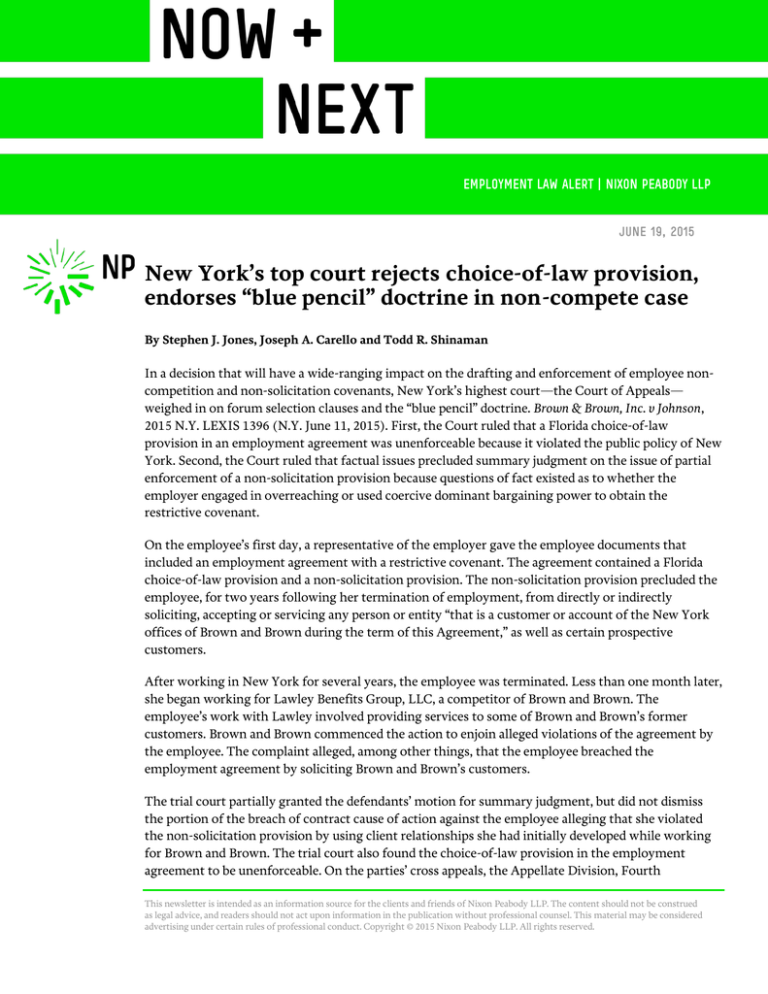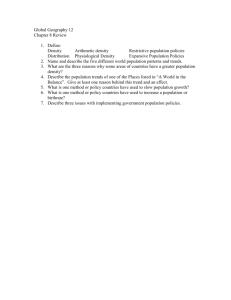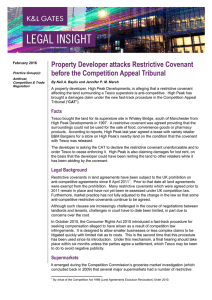
June 19, 2015
New York’s top court rejects choice-of-law provision,
endorses “blue pencil” doctrine in non-compete case
By Stephen J. Jones, Joseph A. Carello and Todd R. Shinaman
In a decision that will have a wide-ranging impact on the drafting and enforcement of employee noncompetition and non-solicitation covenants, New York’s highest court—the Court of Appeals—
weighed in on forum selection clauses and the “blue pencil” doctrine. Brown & Brown, Inc. v Johnson,
2015 N.Y. LEXIS 1396 (N.Y. June 11, 2015). First, the Court ruled that a Florida choice-of-law
provision in an employment agreement was unenforceable because it violated the public policy of New
York. Second, the Court ruled that factual issues precluded summary judgment on the issue of partial
enforcement of a non-solicitation provision because questions of fact existed as to whether the
employer engaged in overreaching or used coercive dominant bargaining power to obtain the
restrictive covenant.
On the employee’s first day, a representative of the employer gave the employee documents that
included an employment agreement with a restrictive covenant. The agreement contained a Florida
choice-of-law provision and a non-solicitation provision. The non-solicitation provision precluded the
employee, for two years following her termination of employment, from directly or indirectly
soliciting, accepting or servicing any person or entity “that is a customer or account of the New York
offices of Brown and Brown during the term of this Agreement,” as well as certain prospective
customers.
After working in New York for several years, the employee was terminated. Less than one month later,
she began working for Lawley Benefits Group, LLC, a competitor of Brown and Brown. The
employee’s work with Lawley involved providing services to some of Brown and Brown’s former
customers. Brown and Brown commenced the action to enjoin alleged violations of the agreement by
the employee. The complaint alleged, among other things, that the employee breached the
employment agreement by soliciting Brown and Brown’s customers.
The trial court partially granted the defendants’ motion for summary judgment, but did not dismiss
the portion of the breach of contract cause of action against the employee alleging that she violated
the non-solicitation provision by using client relationships she had initially developed while working
for Brown and Brown. The trial court also found the choice-of-law provision in the employment
agreement to be unenforceable. On the parties’ cross appeals, the Appellate Division, Fourth
This newsletter is intended as an information source for the clients and friends of Nixon Peabody LLP. The content should not be construed
as legal advice, and readers should not act upon information in the publication without professional counsel. This material may be considered
advertising under certain rules of professional conduct. Copyright © 2015 Nixon Peabody LLP. All rights reserved.
Department modified the trial court’s order by, among other things, dismissing in its entirety the
breach of contract cause of action based on the non-solicitation provision. The Appellate Division held
that the Florida choice-of-law provision was unenforceable as against public policy, and that the nonsolicitation provision was overbroad and unenforceable. Importantly, the Appellate Division held that
the non-solicitation provision could not be partially enforced—a concept often referred to as “blue
penciling”—because the agreement was presented to the employee more than seven years after the
Court of Appeals issued its seminal decision setting forth the standard for enforceability of restrictive
covenants in BDO Seidman v. Hirshberg. The Appellate Division concluded that “the issuance of the
decision in BDO Seidman served as notice to plaintiffs that the agreement at issue here was also overly
broad.” The decision was appealed to the Court of Appeals.
The Court of Appeals contrasted Florida’s approach to enforcing restrictive covenants in employment
agreements—which is widely considered to be one of the most employer-friendly standards in the
country—with New York law. The Court found that the departing employee met her heavy burden of
proving that application of Florida law to the non-solicitation provision of the parties’ agreement
would be offensive to the fundamental public policy of New York. Accordingly, the Court applied New
York law in determining the enforceability of the non-solicitation covenant contained in the
employment agreement.
Nonetheless, applying New York law, the Court concluded that even though “the restrictive covenant
was overbroad to the extent that it prohibited Johnson from working with any of plaintiffs’ New York
customers, even those [the employee] had never met, did not know about and for whom she had done
no work,” it could be partially enforced or “blue penciled.” The Court reversed the Appellate Division’s
complete dismissal of the breach of contract claim, observing that the parties raised questions about
whether the employer engaged in overreaching or used coercive, dominant bargaining power to obtain
the restrictive covenant. The Court noted that the parties disputed whether the departing employee
understood the agreement, whether the employer’s representative discussed or explained it to her,
what the discussion entailed, whether the employee was required to sign it that day, or if she could
have sought advice from counsel and negotiated the terms of the agreement.
This decision provides several key takeaways for employers who ask employees to sign employment
agreements that contain restrictive covenants. First, the decision calls into question the use of choiceof-law provisions where the law of the state chosen is drastically different than the law of New York.
Here, the Court made it clear that the application of Florida law to a New York employee would be
contrary to public policy. Second, the decision breathes new life into the concept of courts’ “blue
penciling” overbroad restrictive covenants in employment agreements, as the Appellate Division’s
decision appeared to signal an end to blue penciling agreements that are overly broad. Of course, to
avoid any uncertainty over whether a restrictive covenant will be enforced, New York employers
should carefully review their employment agreements to ensure that they are narrowly tailored to
protect proprietary and trade secret information and other protectable interests.
For more information on the content of this alert, please contact your Nixon Peabody attorney or:
— Stephen J. Jones at sjones@nixonpeabody.com or 585-263-1386
— Joseph A. Carello at jcarello@nixonpeabody.com or 585-263-1434
— Todd R. Shinaman at tshinaman@nixonpeabody.com or 585-263-1265




